The Niles – Challenging the accepted wisdom of competition
Nile Basin
Started as a collaborative project with journalists from Sudan and South Sudan, “The Niles” later grew to cover the entire Nile basin through an international newsroom that works as a family. Against the accepted wisdom that competition is the main driver of development, they believe that today’s global challenges cannot be solved unless we cooperate.
The Accepted
In his article “A shared destiny”, The Niles correspondent Henry Lutaaya makes a compelling case “why nations that share the same resources must unite”. “There is a need for an atmosphere of social, economic and political cooperation to guarantee peaceful co-existence,” he concludes. Yet, countries in the Nile Basin, just as around the globe, compete against one another, particularly for scarce resources like water.
Don’t we all love a good competition? We love it, in fact so much that our lives are primarily organised around competition. Wherever we look, competition is the accepted credo we encourage globally: in politics, the media and even development cooperation, the best idea, talent, or solution shall win. It is something we, as a human culture, have accepted as a given. After all, competition is derived from observing nature, as only the fittest survive.
Politics from the local, to the national and global spheres, are all about competing interests and positions. Looking at the Nile Basin affairs, there is a clear pattern of competition amongst countries for the scarce resources of the Nile. Within each country, individuals and groups reproduce this same competitive modus operandi.
Looking at the media, the same credo is the law. Beyond the Nile Basin, mainstream media frames our entire world in the context of competing positions and interests, day in and day out, as if life is one big game in which each tries to beat the other and take what is rightfully the winner’s. Yes, the winner takes it all, even though we are fully aware, by now, that this not only pulls billions of people into misery, it also destroys the very planet we depend on for survival.
Within the systems that have shaped this understanding of the world, and the connections we have with all that was, is and will be, the law of competition is as ever-present. Each sender tries to get a competitive advantage over the other. This mostly translates nowadays in getting more clicks on an article, video, picture or audio piece. In turn, each piece, each medium and each message must be optimised, in a never-ending attempt to win the bid for our attention, our interest and therefore our wallets – yes, the winner takes it all. It shouldn’t come as a surprise then, that even with the best of intentions to help people make informed decisions, information gets distorted.
And, as it turns out, by seeking to stay informed – and at times just entertained – we leave a real treasure: our data. This data turns our lives into glasshouses: all our preferences, fears and longings are there to be exploited by countless bidders. The media has turned allegiant to the powerful it was meant to hold to account. Within a very short time, the holders of our data have become the most valued cooperations, and it is unlikely that they will someday wake up and decide to hold themselves accountable. The fourth estate itself has indeed become an estate of power-yielding corporations and individuals. Now, who is going to watch the watchdog?
Well, and then there is development cooperation. By its name declared as an antidote to what is outlined above: a niche that allows working for another understanding of the world where cooperation takes centre stage. In this niche, it is not about interests and positions, but needs – and often basic human needs, that are not fulfilled for many of us. But, as deeply entrenched as competition is in so many aspects of our daily lives, development cooperation, apart of the word itself, has unfortunately little to offer as an antidote – yes, the winner still takes it all.
Today, various players compete for finite funding, the bigger a player is, the more it can invest its resources in acquiring further funds, and the more satisfied the organisation’s hunger for growth is. Driven by achieving results and growth, cooperation among the actors has faded. As competition is result-oriented, little attention is given to the process itself.
Consequently, development cooperation, for the sake of accountability, has transformed into a rather result-oriented venture. However, in terms of creating a more equitable life for all of us, inclusion and participation, or in other words, the process, are much more crucial than the results.
Here we are, recalling on Henry’s words, advocating for “social, economic and political cooperation to guarantee peaceful co-existence” in the Nile Basin, while the dominant framing of our public discourses revolves almost entirely around competition.
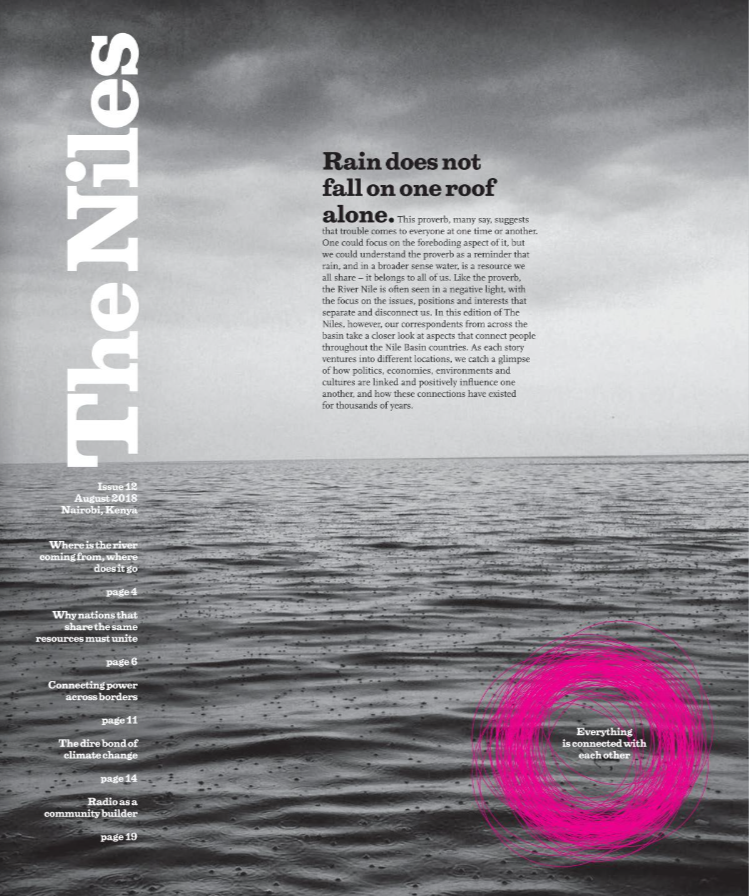
The Challenge
The accepted wisdom of competition as a road for excellence has by and large eclipsed other gems our observation of nature bestowed on us. Cooperation has been a foundational pillar of the success, growth and spread of many species, including humans.
Historian and philosopher Yuval Noah Harari explains that the most impressive achievements of human beings throughout history depended on their “ability to cooperate flexibly in large numbers”. Cooperation amongst humans has, for example, led to the emergence and adoption of money, and by now our survival as individuals is dependent on cooperation: individuals mostly generate income from work in one particular area. All their other needs are satisfied by paying for the products of other people’s work in other areas. Working as a journalist provides an individual with an income that she then uses to pay for food, electricity, water and shelter, all products of others’ individuals’ work. It is difficult to find one individual that is fully self-sustaining in our modern interconnected world.
This sort of cooperation is also entrenched in our daily dynamics and relationships, and yet we fail to recognise its value. “Everything is connected: the hydrology of the Nile with the never-ending circle of water, water with life and life with almost everything in the world,” reads the editorial of the 12th issue of The Niles, entitled “Everything is connected“. It seems as if to thrive and grow, we rely on cooperation. When we think our survival is threatened, we revert to competition. It follows then, that if our ultimate goal is to thrive, and not just so survive, we would be better served by cooperation, rather than competition. Overcoming the competitive worldview, therefore, is a critical challenge. But how? Maybe an intimate concept could aid our thinking: family.
Throughout cultures and times, families have been held up as the fundamental organisational units of societies. Family is the cell through which we are meant to receive our society’s understanding of the world. We talk of harmonious families or dysfunctional ones, modern and traditional, extended or nuclear.
No matter the constellation and the constituents, a family is more than just the sum of its members. It is a particular feeling that transcends justice or reason. Felix Adler said in “Creed and Deed: A Series of Discourses” that “family is the school of duties. But it has this distinguishing excellency, that among those who are linked together by the strong ties of affection, duty is founded on love.”
So this is what we aspire to in our communities: Accepting the diverse forms that families can take, and striving for “the distinguishing excellency” where duties are performed not out of obligation alone, but mostly because they are cushioned by a boundless, inexhaustible source: love.
Healthy members and healthy relationships, built on mutual care, empathy and respect are the hallmarks of a harmonious family. Each member benefits from the family and the family as a unit thrives through the benefits it bestows on its members. Our societies praise healthy, harmonious families.
The basic operating principle for such a unit is a deeply engrained spirit of collaboration – to work together towards a common goal, and cooperation – to work together to produce in abundance, both rooted in trust. When faced with a crisis, the family as a unit relies on its foundational principles and their practice to transcend conflicts, creatively and with commitment. We describe good friends as the family we choose, businesses describe their workers, as a close-knit family.
If we rely on the family concept in our professional and personal endeavours, we would be seeking to create networks of individuals whose relationships are distinctly characterised by a sense of duty to each other, which in turn is based on love. In other words, relationships based on cooperation and collaboration. This is what the members of The Niles have tried and succeeded in achieving.
The Niles
The Niles started as a collaborative journalism capacity building and publishing project with Sudanese and South Sudanese journalists and succeeded, through more than six years, to exemplify working as a family. Each member felt responsible for the others, we cooperated and collaborated, and when things got rough, as they inevitably do, we spoke openly and trusted in each other.
This led to collaborative productions, deep friendships, and in one particular instance, it saved one members’ life. If it had not been for the continuous performance of duties founded on deep care for one another, we would have all, as individuals and as a family, let precious moments and opportunities pass us by, unexplored, unfulfilled.
This effort was noticed: “The Niles is a project that is close to our hearts because it has been extremely successful in the past,” said David Schwake, the former German Ambassador to South Sudan when our team printed and distributed the paper in Juba in 2014. “The publication is quite impressive.”
Indeed, The Niles has earned a unique reputation for its brand of a balanced approach in reporting the complex realities in Sudan and South Sudan. “The Niles is pioneering, presenting remarkable journalistic pieces,” said Ahmad Younes, a correspondent for the international Arabic-language newspaper al-Sharg al-Awsat.
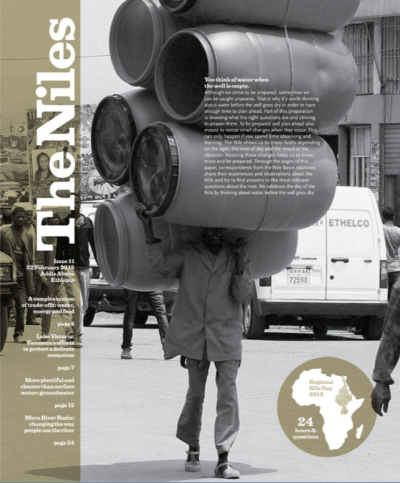
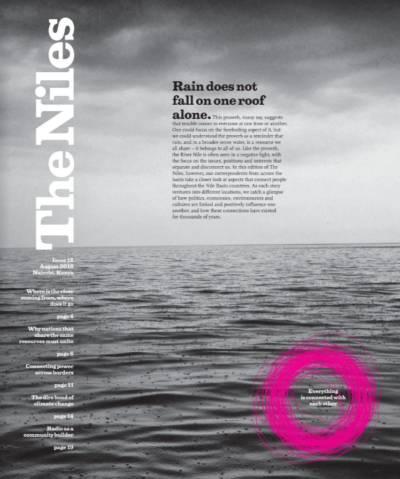
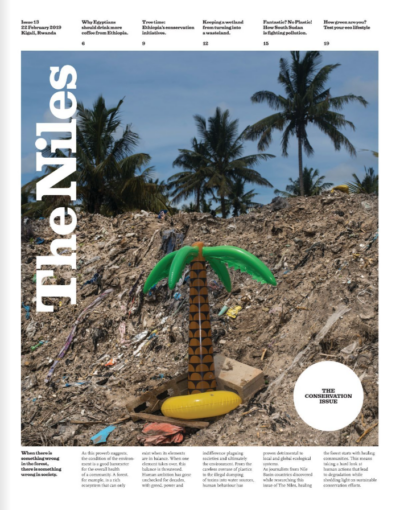
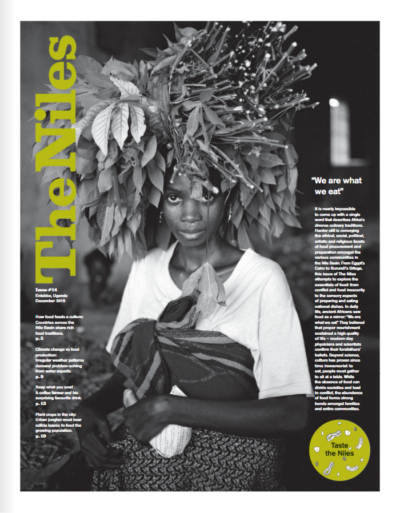
The close-knit network of journalists in Sudan and South Sudan, a living example of how different groups and nationalities can work together successfully and form strong bonds based on mutual trust while striving for excellence, expanded in 2017 to include journalists from beyond Sudan and South Sudan. It transformed into a Nile Basin family.
It is a relatively young unit, and it holds so much potential. All members of this new family share a common passion and concern: the river Nile, and have a shared identity and destiny: the river Nile. It is not a perfect unit, far from it. It is just as a family can be: messy, loving, complex, beautiful and sometimes falls short.
Around the water of the Nile, there is much mistrust, rivalry and one-sidedness. The Niles strives for being an example of how things can be approached differently, with openness, alliance and even-handedness. What is needed most are opportunities to practice collaboration and cooperation.
These will not come on their own, they must be created, and that is what The Niles is all about: a physical example of what transboundary cooperation looks like, through which journalists from Nile Basin countries team up to produce bi-annual print and online magazines that take a look at transboundary water, environment, development and food security challenges while following a conflict-sensitive reporting approach.
This reality extends beyond journalism work, although this is, of course, the central raison d’être of The Niles. Members of this family express themselves beyond their identities as journalists: they are opinion leaders in their own right, and they are also simply people who need to make a living.
These diverse facets must be taken into account for the health of each member and its relation to others. The Niles journalists continuous efforts to inform the public and to build bridges amongst the diverse Nile audiences cannot be separated from the environment in which they evolve.
NGOs working on Nile Basin issues must exert themselves to also build on a spirit of cooperation amongst each other, therefore avoiding duplication from the one hand, and steering clear from useless competitive modes of thinking and operating. It is needless to also add that national identities are deeply rooted and that national governments have a crucial de-escalating role to play within the wider Nile Basin family.
As The Niles, we hope to push forward, presenting as many varied views as possible, making conflicts and possible solutions more transparent, in our work as journalists, and as opinion leaders in our communities. For at the end of the day, the river Nile is a river for all, its waters are the blood in our veins, and we can only thrive when we collaborate and cooperate, as a family.
Commentary by:
Dominik Lehnert, Editor | The Niles
Disclaimer: The views expressed in this commentary are solely those of the author in his private capacity and do not in any way represent the views of Media in Cooperation and Transition (MiCT) gGmbH, or any other The Niles editor. MiCT has neither approved nor endorsed this article.

